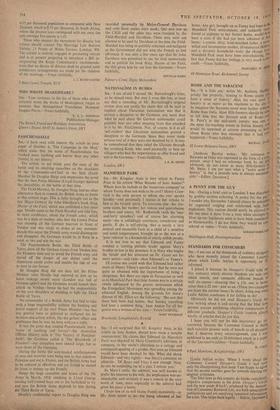MANSFIELD PARK SIR, — Mr. Kingsley Amis is very unjust to Fanny
Price in his review 'What Became of Jane Austen?' Whom does he include in the 'numerous company' to whom Fanny does not wish to be civil? Henry Craw- ford is the only person to whom she ever speaks harshly—and personally I rejoice in her rebuke to him at the Grants' party. To everyone else—her tire- some aunts, her mother, her riotous and quarrelsome brothers and sisters, Mr. Rushworth (with his 'two- and-forty speeches') and of course her alarming uncle—she is unfailingly courteous, considerate and gentle. If she is self-pitying, that is surely a very natural and excusable fault in a child of a sensitive and timid temperament, brought up as she was as a 'poor relation' in a household of utterly selfish people.
It is not true to say that Edmund and Fanny conduct a 'canting pietistic tirade' against Mary's brother-in-law in her presence. It is Mary who begins the 'tirade' and her strictures on Dr. Grant are far more severe—and rude—than Edmund's or Fanny's.
Of course one could wish that Edmund had rather more of Henry Tilney's sparkle and that be were not quite so obsessed with the importance of being a clergyman. But there are signs in Persuasion as well as in Mansfield Park that Jane Austen was to a certain extent influenced by the greater seriousness which the Evangelical Movement was spreading among the educated English. Among the grounds for Anne's distrust of Mr. Elliot are the following : 'She saw that there had been bad habits; that Sunday travelling had been a common thing.' lane Austen for all her genius was a woman of her time.—Yours faithfully,


































 Previous page
Previous page